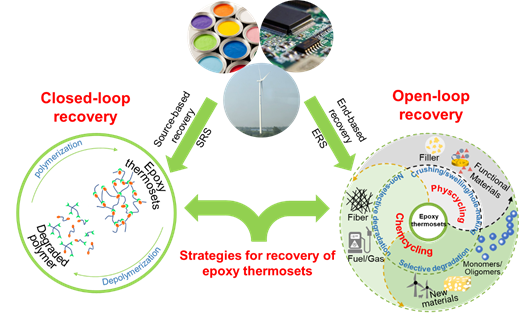Epoxy thermosets is widely used in composite materials, electronic packaging, coatings and adhesives due to its excellent mechanical properties, electrical insulation properties, bonding properties and chemical stability. The rapid rise in epoxy thermoset composite materials used for wind turbine blades is largely driven by increasing consumer demands for new energy sources such as wind power in the world. However, with the upgrading of new products and the expiration of service life, more and more epoxy thermosets and their composites are about to be decommissioned. How to realize the green, efficient and high-value recycling of epoxy thermosets and their composites from the perspective of environmental protection and resource utilization is a major challenge.
Recently, Yu-Zhong Wang's research group was invited to contribute a review paper entitled “Recovery of epoxy thermosets and their composites” for the journal, Materials Today. In particular, based on the research foundation of the team in this field, the review puts forward suggestions on the use of terms on recycling strategies and method. The review summarizes two different strategies including source-based recovery strategy (SRS (Source-based recovery strategy), rational design of recyclable thermosets) and end-based recovery strategy (ERS (End-based recovery strategy), recovery approaches of existing thermosets). The two methods of physcycling and chemcycling based on ERS are focused. In addition, the review highlights important but easily ignored issues in the chemcycling process, including strengthening mass and heat transfer in the degradation process, paying attention to the solvent effect in the separation process, making full use of waste components in the recovery design, and taking into account the economic and environmental benefits of upcycling. The review pointed out that the SRS strategy can realize the 'closed-loop' recovery of epoxy thermosets, but how to improve the reversible dynamic characteristics while maintaining the comprehensive performance is the key to future research. The ERS strategy is mainly about 'open-loop' recovery, which is an important research direction to realize the upcycling of epoxy thermosets. The application-oriented chemcycling should be developed based on selective degradation and effective reconstruction. Besides, it will be very demanding and challenging to design selective catalysts and functional solvents, develop new reconstruction methods to achieve full utilization of degradation products and achieve full recovery of multi-component epoxy thermoset composites in the future.

The review was published on Materials Today under the title 'Recovery of epoxy thermosets and their composites'(DOI: 10.1016/j.mattod.2022.12.005). Sichuan University is the first research unit. Prof. Yu-zhong Wang and Shimei Xu of the College of Chemistry are the co-corresponding authors, and PhD student Xu Zhao is the first author. This work is supported by the National Natural Science Foundation of China (No. 51721091), the 111 project (B20001), the Fundamental Research Funds for the Central Universities (2020SCUNL205) and State Key Laboratory of Polymer Materials Engineering (No. sklpme2020-1-02).
